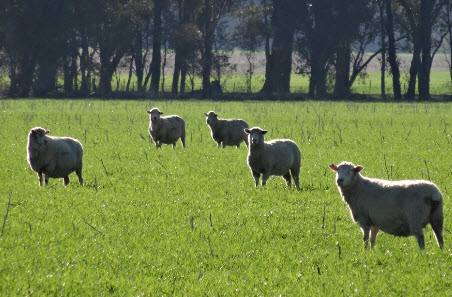Managing mineral deficiencies

Ewes grazing cereal crops are at risk of metabolic disorders caused by mineral deficiencies, such as hypocalcaemia. This risk can be significantly reduced if the correct supplements are provided, MLA-funded research has revealed.
The research confirmed that grazing dual-purpose and spring varieties of wheat, barley and oats can lead to metabolic disorders in reproducing ewes, due to the lower-than-required levels of calcium (Ca), magnesium (Mg) and sodium (Na) and higher-than-tolerable level of potassium (K).
However, Dr David Masters, a livestock systems scientist working on the project with Murdoch University, Charles Sturt University and the NSW Department of Primary Industries, said the traditional industry supplement of lime/salt/causmag (40:20:40) could improve the mineral status of reproducing ewes. Research continues on the development of an even more effective targeted supplement that will further reduce risk.
While research is ongoing, David said the key messages to producers were:
- a high proportion of grazed crops have forage Ca, Na and Mg content below ewe requirements and K content above tolerable levels
- reproducing ewes grazing wheat, and possibly oats and barley, are at risk of metabolic disorders
- Ca deficiencies in reproducing ewes can be reduced by feeding a lime/salt/causmag supplement.
The research team found ewes grazing wheat were most at risk of deficiencies and, while risks with barley or oats appear lower, further investigation is still needed.
Mineral deficiencies were consistent with a high risk of hypocalcaemia or hypomagnesaemia (grass tetany).
In the first year of trials, the mineral status of forage and of pregnant ewes grazing vegetative crops was monitored on 18 farms in Western Australia and southern and central NSW in the final third of pregnancy for 14–24 days.
In 2016, six farms were used with a paddock on each farm divided into three plots to provide forage for 30 ewes for about one month. The ewes were mature, mostly twin bearing and in the last third of pregnancy.
One group was given no supplement (control), another was provided with the standard industry supplement (lime/salt/causmag) and the third group was provided with a mineral supplement specially designed to address potential metabolic disorders.
"The results showed that both mineral supplements improved Ca and, to a lesser extent, Mg status and decreased the risk of hypocalcaemia and hypomagnesaemia. In the control (the unsupplemented ewes), Ca in plasma and urine was in the deficient range for some ewes," David said.
More information
Dr David Masters
E: davidmasters@bigpond.com



